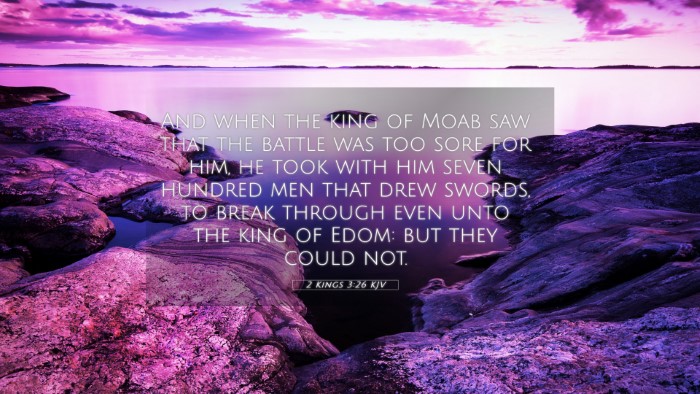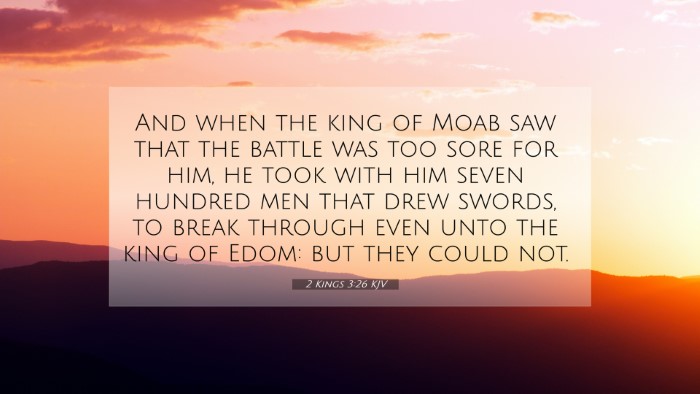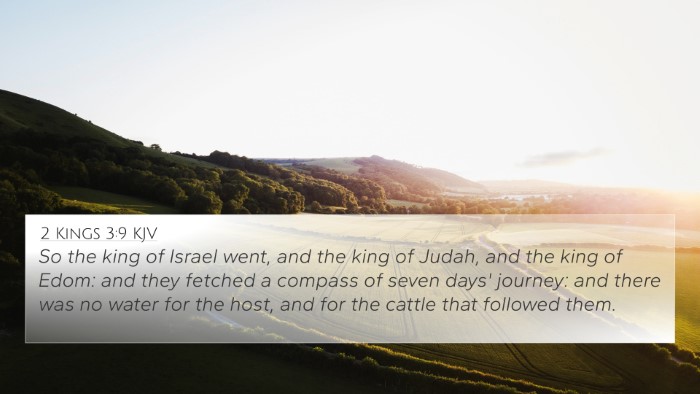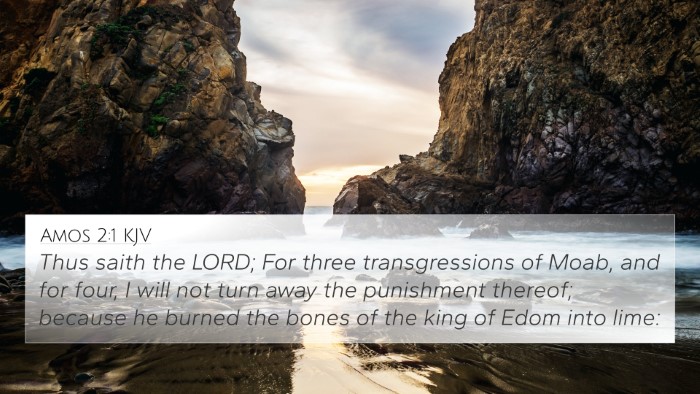Understanding 2 Kings 3:26
This passage, which describes a moment of desperation and a response fueled by fear, provides insightful reflections on human behavior, spiritual consequences, and God's nature.
Verse Context
2 Kings 3:26 states, "And when the king of Moab saw that the battle was too sore for him, he took with him seven hundred men that drew swords, to break through even unto the king of Edom: but they could not." This moment occurs during a coalition of Israel, Judah, and Edom against Moab, marking a pivotal point in the conflict.
Interpretive Insights
-
Desperation and Panic
As noted by Matthew Henry, the king of Moab reacts in a moment of panic, illustrating how fear can drive individuals to desperate measures.
-
The Human Response to Crisis
Adam Clarke emphasizes that the actions of the Moabite king reflect a profound human instinct to resist fate and fight against seemingly insurmountable odds.
-
Spiritual Implications
Albert Barnes points out that this incident serves as a reminder of the spiritual consequences of sin and rebellion, as the Moabites had turned away from God.
-
Symbolism of the Seven Hundred Men
The significance of the number seven, representing completeness or perfection in the Bible, suggests a critical point in the battle, where the king's efforts are futile without divine intervention.
-
Inability to Overcome
This verse highlights the futility of human effort alone, showing that despite his best soldiers, the Moabite king is ultimately unable to prevail against God's plan.
-
Israel's God as Protector
Henry remarks on the deliverance that ultimately comes through the actions of Israel, implying that their success is tied to their covenant with God.
-
Lessons in Leadership
Clarke suggests that leaders should seek divine guidance in critical moments, as reliance solely on human strength leads to failure.
Cross-References
The following verses relate thematically and contextually to 2 Kings 3:26, providing deeper insights through cross-referencing:
- 2 Chronicles 20:12 - Reflection on reliance on God in times of trouble.
- Isaiah 31:1 - Warning against relying on human strength instead of divine help.
- Psalm 60:11-12 - A prayer for help against enemies, affirming that victory comes from God.
- 1 Samuel 14:6 - Jonathan’s faith in God’s ability to save, showing a similar theme of divine intervention.
- Hebrews 11:34 - Examples of faith where individuals were empowered to overcome daunting challenges.
- Jeremiah 17:5 - Curses on those who trust in man rather than God, supporting the themes of trust.
- Luke 18:27 - Affirmation that what is impossible for man is possible with God, echoing the futility of the king’s efforts.
Thematic Connections
The events surrounding 2 Kings 3:26 open dialogues with numerous other Biblical texts, showcasing the interconnectedness of scripture. Here are some themes these connections highlight:
-
Faith vs. Fear
Contrasting the king’s fear-driven actions with the faith exhibited by leaders in similar situations elsewhere in the Bible.
-
Strength in Weakness
Exploring how God often accomplishes His purpose through human weakness (as in 2 Corinthians 12:9).
-
The Importance of Divine Guidance
Understanding the necessity of seeking God’s counsel in all endeavors, directly relating to Proverbs 3:5-6.
Practical Applications
The insights derived from 2 Kings 3:26 encourage believers to:
- Recognize the limits of human strength and the importance of relying on God.
- Stay mindful that panic can lead to poor decisions; instead, seek peace and guidance through prayer.
- Understand the need for reflection on past actions and their spiritual implications when faced with crises.
Conclusion
Through a comprehensive study of 2 Kings 3:26, we see the importance of understanding our dependence on God amidst life's battles. The theme of divine intervention versus human effort resonates throughout the scriptures, reminding us to seek God’s strength in our weakest moments.




